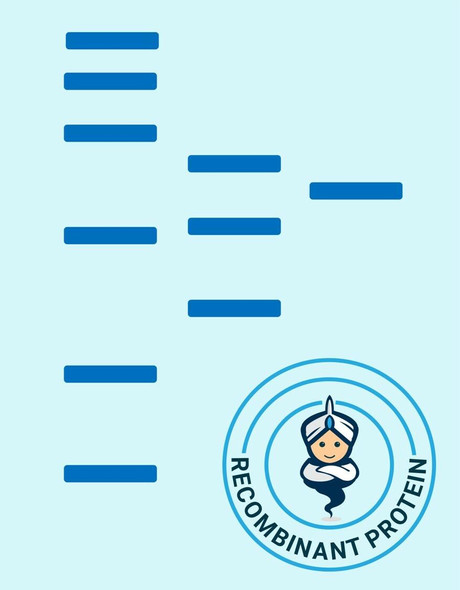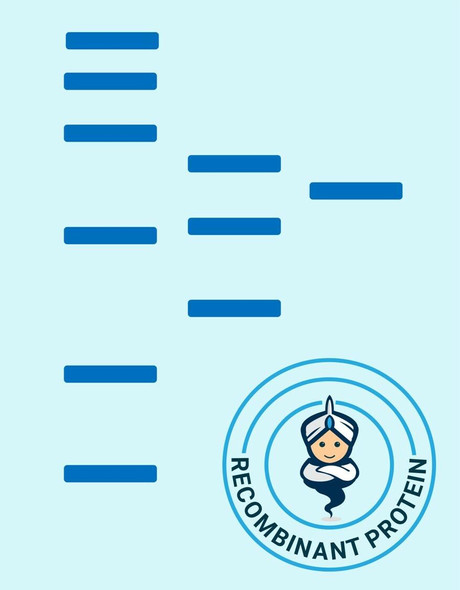Description
| Product Name: | Human CASQ2 Recombinant Protein |
| Product Code: | RPPB2986 |
| Size: | 25µg |
| Species: | Human |
| Target: | CASQ2 |
| Synonyms: | PDIB2, CASQ2, Calsequestrin-2, Calsequestrin cardiac muscle isoform, FLJ26321, FLJ93514. |
| Source: | Escherichia Coli |
| Physical Appearance: | Sterile Filtered clear colorless solution. |
| Formulation: | The CASQ2 solution contains 20mM Tris-HCl pH-8, 0.1M NaCl, 1mM DTT and 20% glycerol. |
| Stability: | Store at 4°C if entire vial will be used within 2-4 weeks. Store, frozen at -20°C for longer periods of time. For long term storage it is recommended to add a carrier protein (0.1% HSA or BSA).Please avoid freeze-thaw cycles. |
| Purity: | Greater than 95% as determined by SDS-PAGE. |
| Amino Acid Sequence: | MRGSHHHHHH GMASMTGGQQ MGRDLYDDDD KDRWGSMEEG LNFPTYDGKD RVVSLSEKNF KQVLKKYDLL CLYYHEPVSS DKVTQKQFQL KEIVLELVAQ VLEHKAIGFV MVDAKKEAKL AKKLGFDEEG SLYILKGDRT IEFDGEFAAD VLVEFLLDLI EDPVEIISSK LEVQAFERIE DYIKLIGFFK SEDSEYYKAF EEAAEHFQPY IKFFATFDKG VAKKLSLKMN EVDFYEPFMD EPIAIPNKPY TEEELVEFVK EHQRPTLRRL RPEEMFETWE DDLNGIHIVA FAEKSDPDGY EFLEILKQVA RDNTDNPDLS ILWIDPDDFP LLVAYWEKTF KIDLFRPQIG VVNVTDADSV WMEIPDDDDL PTAEELEDWI EDVLSGKINT EDDDEDDDDD DNSDEEDNDD SDDDDDE |
CASQ2 belongs to the calsequestrin family and is localized to the sarcoplasmic reticulum in cardiac and slow skeletal muscle cells. CASQ2 is a calcium binding protein that stores calcium for muscle function. The discharge of calcium bound to CASQ2 through a calcium release channel activates muscle contraction. CASQ2 binds 40 to 50 moles of calcium. CASQ2 mutations result in stress-induced polymorphic ventricular tachycardia, also called catecholaminergic polymorphic ventricular tachycardia 2 which is known fir its bidirectional ventricular tachycardia that causes cardiac arrest.
CASQ2 Human Recombinant fused to 37 amino acid His Tag at N-terminal produced in E.Coli is a single, non-glycosylated, polypeptide chain containing 417 amino acids (20-399 a.a.) and having a molecular mass of 48.4 kDa. The CASQ2 is purified by proprietary chromatographic techniques.
| UniProt Protein Function: | calsequestrin 2: Calsequestrin is a high-capacity, moderate affinity, calcium-binding protein and thus acts as an internal calcium store in muscle. The release of calcium bound to calsequestrin through a calcium release channel triggers muscle contraction. The skeletal muscle isoform (CASQ1) binds around 80 Ca(2+) ions, while the cardiac isoform (CASQ2) binds approximately 60 Ca(2+) ions. Defects in CASQ2 are the cause of catecholaminergic polymorphic ventricular tachycardia type 2 (CPVT2); also known as stress-induced polymorphic ventricular tachycardia (VTSIP). CPVT2 is an autosomal recessive form of arrhythmogenic disorder characterized by stress-induced, bidirectional ventricular tachycardia that may degenerate into cardiac arrest and cause sudden death. Belongs to the calsequestrin family. |
| UniProt Protein Details: | Protein type:Calcium-binding Chromosomal Location of Human Ortholog: 1p13.1 Cellular Component: sarcoplasmic reticulum membrane; sarcoplasmic reticulum lumen; sarcoplasmic reticulum; junctional membrane complex; cytoplasm; voltage-gated calcium channel complex; intracellular; Z disc Molecular Function:protein binding; protein homodimerization activity; calcium ion binding; calcium-dependent protein binding Biological Process: protein polymerization; striated muscle contraction; regulation of heart rate; negative regulation of potassium ion transport; sequestering of calcium ion; detection of calcium ion; sarcomere organization; transmembrane transport; cardiac muscle contraction Disease: Ventricular Tachycardia, Catecholaminergic Polymorphic, 1, With Or Without Atrial Dysfunction And/or Dilated Cardiomyopathy; Ventricular Tachycardia, Catecholaminergic Polymorphic, 2 |
| NCBI Summary: | The protein encoded by this gene specifies the cardiac muscle family member of the calsequestrin family. Calsequestrin is localized to the sarcoplasmic reticulum in cardiac and slow skeletal muscle cells. The protein is a calcium binding protein that stores calcium for muscle function. Mutations in this gene cause stress-induced polymorphic ventricular tachycardia, also referred to as catecholaminergic polymorphic ventricular tachycardia 2 (CPVT2), a disease characterized by bidirectional ventricular tachycardia that may lead to cardiac arrest. [provided by RefSeq, Jul 2008] |
| UniProt Code: | O14958 |
| NCBI GenInfo Identifier: | 119395727 |
| NCBI Gene ID: | 845 |
| NCBI Accession: | NP_001223.2 |
| UniProt Secondary Accession: | O14958,Q5T1D2, Q8TBW8, B2R7M6, |
| UniProt Related Accession: | O14958 |
| Molecular Weight: | 46,436 Da |
| NCBI Full Name: | calsequestrin-2 |
| NCBI Synonym Full Names: | calsequestrin 2 (cardiac muscle) |
| NCBI Official Symbol: | CASQ2�� |
| NCBI Official Synonym Symbols: | PDIB2�� |
| NCBI Protein Information: | calsequestrin-2; calsequestrin, cardiac muscle isoform; calsequestrin 2, fast-twitch, cardiac muscle |
| UniProt Protein Name: | Calsequestrin-2 |
| UniProt Synonym Protein Names: | Calsequestrin, cardiac muscle isoform |
| Protein Family: | Calsequestrin |
| UniProt Gene Name: | CASQ2�� |
| UniProt Entry Name: | CASQ2_HUMAN |






